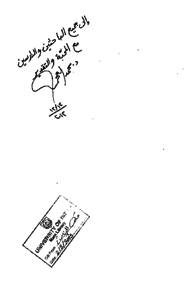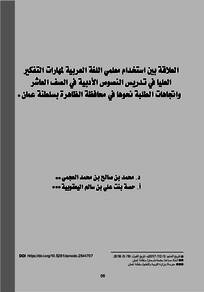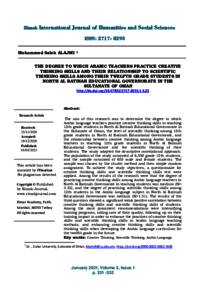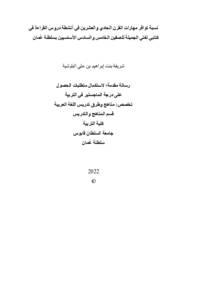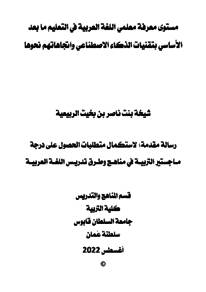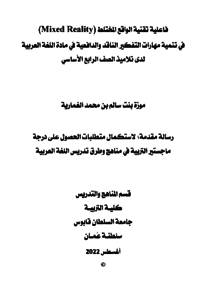Document
فاعلية استراتيجيات التعلم الذاتي في تنمية المهارات العقلية العليا في النصوص الأدبية، وفي بقاء أثر التعلم لدى طلبة الصف الحادي عشر بسلطنة عمان.
Publisher
معهد البحوث والدراسات العربية.
Gregorian
2010
Language
Arabic
English abstract
This study aims to identify the effectiveness of the use of self-learning strategies (semi-guided discovery and learning modules) in literary texs in the acquisition of higher order thinking skills (analysis, synthesis, and evaluation) and in the learning retention of Grade 11 students in the Sultanante of Oman. The research problem is devided into the following questions:
a. What are the higher order thinking skills (analysis, synthesis, and
evaluation) of literary texts for Grade 11 students?
b. To what extent do these skills exist in Grade 11 students?
c. What are the specifications of a program proposed for learning literary texts, based on the use of self-learning strategies, and aiming at developing the higher order thinking skills (analysis, synthesis, and evaluation)?
P
d. How effective is the proposed program in developing the higher order thinking skills (analysis, synthesis, and evaluation) of literary texts of Grade 11 students?
e. How effective is the proposed program in the learning retention of
literary texts?
f. Are there statistically significant differences among the sample of the dependent variable attributable to gender?
To answer these research questions, the researcher has done the following:
1. Preparing an integrated plan defining the research problem, its hypotheses, its significance in education, the temporal, spatial and substantive limits, procedural terminology, and research procedures.
2. Surveying the relevant literature to form a theoretical framework as a basis for the current study, which gives a brief about self-learning and its strategies, its levels of learning, and the role of both the teacher and the learner, and listing the most basic skills that should be taken into consideration in teaching self-learning-based literary texts to Grade 11 students.
3. Defining the study field procedures which are (1)determining the study population which is composed of all Grade 11 students in North Batina Region in Sultanate of Oman, (2)selecting a purposive sample of 180 male and female, (3)listing 14 higher order thinking skills in analysis, synthesis, and evaluation, (4)designing two trial programs based on semi-guided discovery and learning modules and testing their validity and reliability, and (5) designing the tests associated with these programs and testing their validity and reliability.
4. Applying the two programs and their supplements on the sample, which resulted as follows:
a. Self-learning, represented in semi-guided discovery and learning modules strategies, has effectively led to the development of higher order thinking skills (analysis, synthesis, and evaluation) of the literary texts necessary for Grade 11 students. The results of the students of the two experimental groups were better than the students of the control group in the post tests, and the students of the experimental groups achieved better in the post test than in the pretest. Therefore, this proves the effectiveness of these two strategies in teaching literary texts.
b. Self-learning, represented in semi-guided discovery and learning modules strategies, has caused learning retention to last longer. The students' of the experimental group outperformed the students of the control group in learning retention test. In addition, the students of the experimental group scored higher in the learning retention test than in the post test.
"
c. The statistical data treatment proved that there is a significant difference between male and female students in developing higher order thinking skills and learning retention.
The study concludes with some recommendations as follows:
1. Self-learning strategies of literary texts in particular and learning Arabic in general should be developed and given more attention, whether in the preparation of the curriculum or in the teaching methods used in active learning based on the learner's effort and self action.
2. Learning Resource Centers should be equipped with all audio-visual ·
and interactive learning and teaching materials and activities which increase the effectiveness of self-learning strategies.
3. The democracy of learning should be developed and enhanced in
Students.
The primary proposals advocated by this study are as follows:
1. Designing scientific measures for literature appreciation for Post Basic Education students.
2. Conducting more action researches on the effectiveness of self- learning strategies in learning Arabic and learning retention of students using other variables.
3. Conducting a critical study on the content of the scope and sequence matrix for Arabic Language curriculum for Post Basic Education in the light of the higher order thinking skills and its development strategies.
Member of
Resource URL
Arabic abstract
هدفت الدراسة الحالية إلى تعرف فاعلية استخدام استراتيجيتي ) الاكتشاف شبه الموجه والوحدات التعليمية الصغيرة ) في التعلم الذاتي لتعلم النصوص الأدبية على اكتساب المهارات العقلية العليا ( التحليل، والتركيب، والتقويم ) ، وبقاء أثر التعلم لدى طلبة الصف الحادي عشر بسلطنة عمان.
وتتفرع من هذه المشكلة البحثية الأسئلة الآتية:
1. ما مهارات المستويات العقلية العليا ( التحليل، والتركيب، والتقويم ( الخاصة بالنصوص الأدبية اللازمة لطلبة الصف الحادي عشر؟
2. ما مدى توافر هذه المهارات لدى طلبة الصف الحادي عشر؟
3. ما مواصفات برنامج مقترح لتعلم النصوص الأدبية قائم على استراتيجيات التعلم الذاتي
يستهدف تنمية المهارات العقلية العليا ( التحليل والتركيب، والتقويم ) ؟
4. ما فاعلية البرنامج المقترح في تنمية مهارات المستويات العقلية العليا ( التحليل والتركيب والتقويم ( الخاصة بالنصوص الأدبية اللازمة لطلبة الصف الحادي عشر؟
5. ما فاعلية البرنامج المقترح في بقاء أثر تعلم النصوص الأدبية لدى طلبة الصف الحادي عشر ؟
6. هل هناك فروق دالة إحصائيا بين طلبة العينة في المتغير التابع تعزى إلى النوع؟
وللإجابة عن هذه الأسئلة البحثية فقد قام الباحث بالآتي:
1. إعداد خطة متكاملة للدراسة بينت مشكلتها البحثية، وفروضها، وأهميتها في الحقل التربوي
وحدودها الزمانية والمكانية والموضوعية، والمصطلحات الإجرائية والإجراءات البحثية.
2. مسح الأدبيات التربوية ذات الصلة بموضوع الدراسة؛ لتكوين إطار نظري تستند عليه الدراسة الحالية، ويعطي نبذة عن التعلم الذاتي واستراتيجياته، ومستوياته التعلمية، ودور كل من المعلم والمتعلم في تحقيقه، وبيان أبرز المهارات الأساسية التي ينبغي التنبه إليها عند تدريس النصوص الأدبية باستراتيجية التعلم الذاتي لطلبة الصف الحادي عشر.
3.تحديد إجراءات الدراسة الميدانية التي تمثلت في مجتمع الدراسة المكون من جميع طلبة : الصف الحادي عشر بمنطقة شمال الباطنة التعليمية بسلطنة عمان، ثم عينتها التي تم تخيرها بطريقة قصدية وتحددت في (۱۸۰) طالبا وطالبة، ثم تحديد قائمة مكونة من أربع عشرة مهارة عقلية عليا في التحليل والتركيب والتقويم ثم بناء البرنامجين التجريبيين باستراتيجية الاكتشاف شبه الموجه واستراتيجية الوحدات التعليمية الصغيرة، وإيجاد صدقهما وثباتهما، ثم بناء الاختبارات المرافقة لتطبيق البرنامجين وإيجاد صدقهما وثباتهما، مع دليل إرشادي للمعلم.
4. تطبيق برنامجي الدراسة ومرفقاتهما على العينة، والتي أسفرت عن النتائج الآتية:
أ- أن التعلم الذاتي متمثلا في استراتيجيتي الاكتشاف شبه الموجه والوحدات التعليمية الصغيرة قــــد أدى إلى تنمية مهارات المستويات العقلية العليا ) التحليل، والتركيب، والتقويم ) الخاصة بالنصوص الأدبية اللازمة لطلبة الصف الحادي عشر بصورة فاعلة؛ حيث تفوق طلبة المجموعتين التجريبيتين على طلبة المجموعة الضابطة في نتائج الاختبارات البعدية، وتفوق طلبة المجموعة التجريبية في نتائج الاختبارات البعدية مقارنة بنتائج الاختبارات القبلية؛ مما يعني فاعلية الاستراتيجيتين التعلميتين في مجال تدريس النصوص الأدبية.
ب- أن التعلم الذاتي متمثلا في استراتيجيتي الاكتشاف شبه الموجه والوحدات التعليمية الصغيرة قد ساعد على الاحتفاظ ببقاء أثر التعلم لدى الطلبة لأمد أطول؛ حيث تفوق طلبة المجموعة التجريبية على طلبة المجموعة الضابطة في نتائج اختبار بقاء أثر التعلم، وتفوق طلبة المجموعة التجريبية في نتائج اختبار بقاء أثر التعلم مقارنة بالاختبار البعدي.
ت- أثبتت المعالجة الإحصائية وجود فروق ذات دلالة إحصائية بين نتائج كل من والطالبات لصالح الطالبات في تنمية المهارات العقلية العليا، وفي الاحتفاظ ببقاء أثر التعلم. هذا وقد خلصت الدراسة بمجموعة من التوصيات من أهمها:
1. الاهتمام بمختلف استراتيجيات التعلم الذاتي في تعلم النصوص الأدبية خصوصا، وفي تعلم اللغة العربية عموما، سواء في إعداد المناهج، أو في طرائق التدريس واستراتيجياته المتبعة في مناهج التعلم النشط ، القائم على جهد المتعلم ونشاطه الذاتي وتطويرها.
2. رفد مراكز مصادر التعلم بمختلف الوسائل والمواد والأنشطة التعليمية التعلمية السمعية والبصرية والتفاعلية التي تساعد على نجاعة التعلم بهذه الأساليب التعلمية.
3. الاهتمام بديمقراطية التعلم وتعزيزها في نفوس الطلبة المتعلمين.
أما أبرز المقترحات التي تنادي بها هذه الدراسة فهي:
1. بناء مقاييس علمية لقياس درجة التذوق الأدبي في النصوص الأدبية لدى طلبة التعليم ما بعد
الأساسي، وتوظيفها في مناهج التعليم، واستراتيجيات التدريس.
2. إجراء دراسات تجريبية أخرى تبحث في فاعلية استراتيجيات التعلم الذاتي في تعلم اللغة
العربية وبقاء أثر التعلم لدى الطلبة باستخدام متغيرات أخرى.
3. إجراء دراسة نقدية لمحتوى مصفوفة المدى والتتابع لمنهاج اللغة العربية لمرحلة التعليم ما بعد
الأساسي في ضوء المهارات العقلية العليا واستراتيجيات تنميتها.
وتتفرع من هذه المشكلة البحثية الأسئلة الآتية:
1. ما مهارات المستويات العقلية العليا ( التحليل، والتركيب، والتقويم ( الخاصة بالنصوص الأدبية اللازمة لطلبة الصف الحادي عشر؟
2. ما مدى توافر هذه المهارات لدى طلبة الصف الحادي عشر؟
3. ما مواصفات برنامج مقترح لتعلم النصوص الأدبية قائم على استراتيجيات التعلم الذاتي
يستهدف تنمية المهارات العقلية العليا ( التحليل والتركيب، والتقويم ) ؟
4. ما فاعلية البرنامج المقترح في تنمية مهارات المستويات العقلية العليا ( التحليل والتركيب والتقويم ( الخاصة بالنصوص الأدبية اللازمة لطلبة الصف الحادي عشر؟
5. ما فاعلية البرنامج المقترح في بقاء أثر تعلم النصوص الأدبية لدى طلبة الصف الحادي عشر ؟
6. هل هناك فروق دالة إحصائيا بين طلبة العينة في المتغير التابع تعزى إلى النوع؟
وللإجابة عن هذه الأسئلة البحثية فقد قام الباحث بالآتي:
1. إعداد خطة متكاملة للدراسة بينت مشكلتها البحثية، وفروضها، وأهميتها في الحقل التربوي
وحدودها الزمانية والمكانية والموضوعية، والمصطلحات الإجرائية والإجراءات البحثية.
2. مسح الأدبيات التربوية ذات الصلة بموضوع الدراسة؛ لتكوين إطار نظري تستند عليه الدراسة الحالية، ويعطي نبذة عن التعلم الذاتي واستراتيجياته، ومستوياته التعلمية، ودور كل من المعلم والمتعلم في تحقيقه، وبيان أبرز المهارات الأساسية التي ينبغي التنبه إليها عند تدريس النصوص الأدبية باستراتيجية التعلم الذاتي لطلبة الصف الحادي عشر.
3.تحديد إجراءات الدراسة الميدانية التي تمثلت في مجتمع الدراسة المكون من جميع طلبة : الصف الحادي عشر بمنطقة شمال الباطنة التعليمية بسلطنة عمان، ثم عينتها التي تم تخيرها بطريقة قصدية وتحددت في (۱۸۰) طالبا وطالبة، ثم تحديد قائمة مكونة من أربع عشرة مهارة عقلية عليا في التحليل والتركيب والتقويم ثم بناء البرنامجين التجريبيين باستراتيجية الاكتشاف شبه الموجه واستراتيجية الوحدات التعليمية الصغيرة، وإيجاد صدقهما وثباتهما، ثم بناء الاختبارات المرافقة لتطبيق البرنامجين وإيجاد صدقهما وثباتهما، مع دليل إرشادي للمعلم.
4. تطبيق برنامجي الدراسة ومرفقاتهما على العينة، والتي أسفرت عن النتائج الآتية:
أ- أن التعلم الذاتي متمثلا في استراتيجيتي الاكتشاف شبه الموجه والوحدات التعليمية الصغيرة قــــد أدى إلى تنمية مهارات المستويات العقلية العليا ) التحليل، والتركيب، والتقويم ) الخاصة بالنصوص الأدبية اللازمة لطلبة الصف الحادي عشر بصورة فاعلة؛ حيث تفوق طلبة المجموعتين التجريبيتين على طلبة المجموعة الضابطة في نتائج الاختبارات البعدية، وتفوق طلبة المجموعة التجريبية في نتائج الاختبارات البعدية مقارنة بنتائج الاختبارات القبلية؛ مما يعني فاعلية الاستراتيجيتين التعلميتين في مجال تدريس النصوص الأدبية.
ب- أن التعلم الذاتي متمثلا في استراتيجيتي الاكتشاف شبه الموجه والوحدات التعليمية الصغيرة قد ساعد على الاحتفاظ ببقاء أثر التعلم لدى الطلبة لأمد أطول؛ حيث تفوق طلبة المجموعة التجريبية على طلبة المجموعة الضابطة في نتائج اختبار بقاء أثر التعلم، وتفوق طلبة المجموعة التجريبية في نتائج اختبار بقاء أثر التعلم مقارنة بالاختبار البعدي.
ت- أثبتت المعالجة الإحصائية وجود فروق ذات دلالة إحصائية بين نتائج كل من والطالبات لصالح الطالبات في تنمية المهارات العقلية العليا، وفي الاحتفاظ ببقاء أثر التعلم. هذا وقد خلصت الدراسة بمجموعة من التوصيات من أهمها:
1. الاهتمام بمختلف استراتيجيات التعلم الذاتي في تعلم النصوص الأدبية خصوصا، وفي تعلم اللغة العربية عموما، سواء في إعداد المناهج، أو في طرائق التدريس واستراتيجياته المتبعة في مناهج التعلم النشط ، القائم على جهد المتعلم ونشاطه الذاتي وتطويرها.
2. رفد مراكز مصادر التعلم بمختلف الوسائل والمواد والأنشطة التعليمية التعلمية السمعية والبصرية والتفاعلية التي تساعد على نجاعة التعلم بهذه الأساليب التعلمية.
3. الاهتمام بديمقراطية التعلم وتعزيزها في نفوس الطلبة المتعلمين.
أما أبرز المقترحات التي تنادي بها هذه الدراسة فهي:
1. بناء مقاييس علمية لقياس درجة التذوق الأدبي في النصوص الأدبية لدى طلبة التعليم ما بعد
الأساسي، وتوظيفها في مناهج التعليم، واستراتيجيات التدريس.
2. إجراء دراسات تجريبية أخرى تبحث في فاعلية استراتيجيات التعلم الذاتي في تعلم اللغة
العربية وبقاء أثر التعلم لدى الطلبة باستخدام متغيرات أخرى.
3. إجراء دراسة نقدية لمحتوى مصفوفة المدى والتتابع لمنهاج اللغة العربية لمرحلة التعليم ما بعد
الأساسي في ضوء المهارات العقلية العليا واستراتيجيات تنميتها.
Category
Theses and Dissertations

